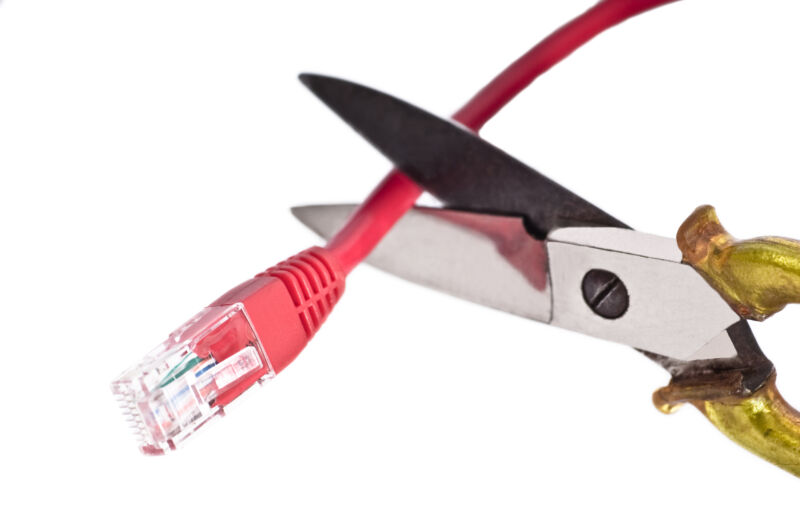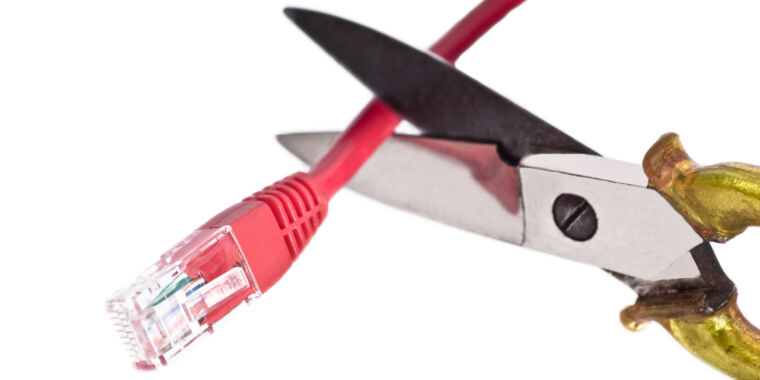
A major internet service provider wants the Supreme Court to rule that ISPs don't have to cut off broadband users accused of piracy. Cable company Cox Communications, which is seeking to overturn a ruling in a copyright infringement lawsuit filed by Sony, asked the Supreme Court yesterday to hear the case.
Cox said in a press release that a recent appeals court ruling “would force Internet service providers to terminate Internet service to households or businesses based on unsubstantiated allegations of infringing activity, and would put them in a position of having to police their networks — contrary to customer expectations… Terminating Internet service would not only impact the person accused of unlawfully downloading content, it would take an entire household off the Internet.”
The case began in 2018, when Sony and other copyright holders sued Cox, alleging that the company had failed to adequately combat piracy on its network and shut down repeat infringers. A jury in the U.S. District Court for the Eastern District of Virginia ruled in December 2019 that Cox must pay $1 billion in damages to the major labels.
Digital rights groups including the Electronic Frontier Foundation (EFF) objected to the ruling, saying it “would result in the loss of essential internet access by innocent and vulnerable users.” The case went to the U.S. Court of Appeals for the 4th Circuit, which in February 2024 threw out the $1 billion damages award but upheld one of the company’s key copyright infringement rulings.
Specifically, the court of appeals affirmed the jury's finding that Cox was guilty of willful contributory infringement and reversed a verdict on indirect infringement. The verdict on indirect liability was vacated “because Cox did not profit from the infringements of its subscribers.”
Cox wants ruling on complicit infringement
As for the charge of contributory infringement, the appeals court judges said their hands were tied in part by the fact that Cox had not made a significant argument in district court. Proving “contributory infringement by an Internet service provider based on the direct infringement of its subscribers” can be accomplished by showing “willful blindness,” the court said.
“Cox did not argue in the district court, as he now does on appeal, that notices of prior infringement did not show that he knew that the same subscriber would almost certainly infringe again… Because Cox failed to raise that argument in the district court, it is forfeited on appeal,” the appeals court said. In the district court, Cox argued that notices of copyright infringement sent to the ISP were too vague.
The Supreme Court has in MGM vs. Groksterin 2005, that “a person who distributes a device with the intent to promote its use to infringe copyright, as evidenced by a clear statement or other affirmative steps taken to promote infringement, which go beyond mere distribution with knowledge of the third party's actions, is liable for the resulting acts of infringement by third parties using the device, regardless of the lawful use of the device.”
Cox argued in his petition to the Supreme Court yesterday that the appellate courts “are split down the middle on the scope of that ruling and have developed different standards for when it is appropriate to hold an online service provider secondarily liable for copyright infringement by users.”
Cox asked the justices to decide whether the Fourth Circuit “erred[ed] by stating that a service provider can be held liable for “materially contributing” to copyright infringement merely because it knew that people were using certain accounts to infringe and failed to terminate access, without evidence that the service provider actually encouraged or otherwise intended to encourage infringement.”
The case raises another important question, Cox told the Supreme Court:
Generally, a defendant cannot be held liable as a willful violator of the law — and subject to greater penalties — without proof that he knew or recklessly disregarded that his own conduct was illegal. Conflicting with the Eighth Circuit, the Fourth Circuit upheld an instruction allowing a jury to find willfulness if Cox knew that his subscribers' conduct was illegal — without proof that Cox knew that his own conduct in failing to terminate them was illegal.
Judges must decide whether the Fourth Circuit “erred[ed] “By holding that mere knowledge of another's direct infringement is sufficient to establish intent,” Cox said.

